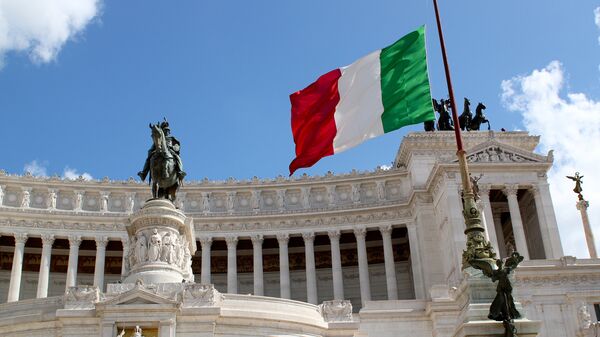Sputnik discussed the reasons Italy is so problematic for the EU with Alexander von Witzleben, an economic historian from Brussels.
READ MORE: 'There Is Room for Italy to Change Budget Targets' — Scholar
Sputnik: Why is Italy so problematic for the EU, given that other EU nations have national debt levels higher than that of Italy?
Alexander von Witzleben: Italy is outstanding in that it is not following the recommendations which were given. So all the other member states, including Greece, which has a higher debt, are following what the 28 member states have agreed upon. You have to see that the European Union is a kind of football team and you have agreed upon rules and if one player is not sticking to the rules and is not doing what the coach had told him, the whole team may lose, so if you are a community you have to stick together and to do what has been agreed upon.
Sputnik: I agree with you and I understand that point. However, what can you say about the rules? Perhaps the rules need to be looked at again. Because Greece has implemented a lot of austerity measures and it doesn't look like the economy is significantly improving; as we've noted, it's [got] the highest [debt level] in the European Union; Greek public debt is 180.4% of GDP, it is significantly higher than the rest of the countries, and they have been abiding is there perhaps a problem with the rules? Do they need to be looked at again?
Alexander von Witzleben: Greece has shown some improvement in the past, it is back on growth, I think the economy has grown 2% which is among the highest rates in the European Union. So there is stabilization which can be observed and also the debt is being reduced and there's a long-term plan to reduce the debt so I think this is a common, agreed procedure and it works out, and it is different in the case of Italy.
READ MORE: Italy's Prime Minister Declines Changing 2019 Budget Plan
Sputnik: Let's talk about the logic of placing sanctions on the country that's already doing very poorly. I can imagine that it's mostly intended to be a deterrent, those sanctions, but if it comes down to applying sanctions, if they're not successful in deterring Italy, what kind of sanctions can we expect? How will that affect the economy, first of all? Obviously I'm imagining that if this is a deterrent, it's supposed to work on the politicians who make the policies, the fiscal policy makers. If will look at when the next elections coming up, if those sanctions, if they're going to be applied most likely after the European Union elections, are they going to be a deterrent for the incumbent politicians in Italy?
Alexander von Witzleben: The sanctions will not be such a big blow, they will be around 3.4 billion euros, and as you said it's a deterrent for the government and for the other governments, so that all stick to the rules in the future. As I said, in a football team if one player is not behaving correctly the referee has to call him and penalize him somehow, and the 3.4 billion (euros) is not so much given the tens of billions of euros which Europe is paying to Italy, Italy is one of the highest recipients of EU structural funds, so that would be not such a big blow.
The views and opinions expressed by the speaker do not necessarily reflect those of Sputnik.

